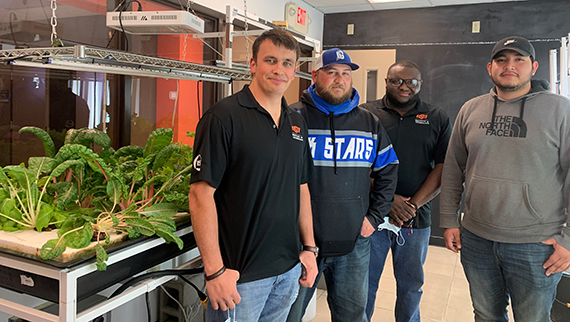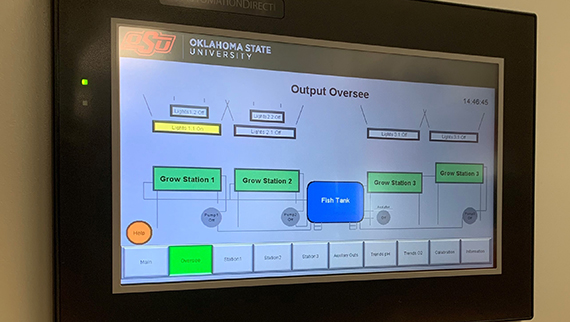
The aquaponics lab within the Culinary Arts program at OSU Institute of Technology recently encountered a serious issue; fish and plants were dying due to water pH levels. When the Instrumentation Engineering Technology capstone class heard about this issue, the students sprang into action.
"This lab requires fairly close monitoring of water levels, pH, ammonia, temperature and nitrates," said Celia Melson, Culinary Arts instructor. "If something in the system gets off, it can lead to unsafe levels for the fish, which then can lead to their death if not remedied, as well as the death of plants. If, for some reason, the system cannot be monitored regularly (i.e., school break, quarantined, etc.), there can be issues that cause a fish to die. If one fish dies, the ammonia levels can rise to unsafe levels causing further fish issues and deaths."
In the past, it took a significant amount of time for the Culinary Arts students to
measure the chemicals of the water and make sure they were optimal for fish and plant
life. Now, this system is automated.
Instrumentation Engineering students Cole Crum, Brandon Huizaz, Dustin Martin and Jadarius Williams worked together to develop a system that monitors the fish tank's pH, temperature, water, and oxygen levels. They also developed a program to set up pump and light schedules for further system regulations. Further, the system allows for remote monitoring through alerts sent to an email address if something in the lab is outside of the normal range.
"My students will be able to use the data collected from this system to determine the needs for more testing if the results are outside the normal range," said Melson. "This allows them to troubleshoot any issues and make amendments or modifications before plant of fish loss might occur."
"The students got real world experience in building a project from the ground up. There is no better experience then real world," said Amanda Cullum, Instrumentation Engineering instructor. "This project incorporated the majority of their core classes, which helps to show the students what they learn in the classroom they will use in the workforce. This helped bring it all back to a full circle."
The project is not complete yet. It is ongoing through the summer for a new group of students working on hydroponic updates for the lab. Parker Schraeder and Caleb Winter are currently working on the lab.
Schraeder, an Instrumentation student from Mannford, is handling the budget, supplies, and paperwork for this next phase of the project, eventually to be team lead.
"This project is providing me a chance to use the skills I've learned at OSUIT," said Schraeder. "It's giving me great experience of what I can expect when I graduate and enter the workforce. I can work with a team as well as lead a team for projects."
He says that the most valuable thing he has learned from this is teamwork and accountability.
"I want my team to be able to work together out in the field, and I want to make sure that they can count on me so that we can finish our project within the limited time we have together."
Schraeder enjoys the hands-on experience this project provides, which is why he chose to attend OSUIT.
"I like that they give me the opportunity to use what I've been taught," he said. "I am a visual learner, so for me, this has been a great help."
Melson said she was impressed by this group of students.
"The students who worked on this project were over frequently to check on things and to ask questions and eat lunch," said Melson. "They often asked high-level questions and wanted to understand how the system worked and what types of features might be beneficial to add to the project. I like to think having to approach and ask questions aided their soft skills and hopefully prepared them more for their industry as they graduate."
Cullum said that she knew they wanted to help optimize this system when she heard about the aquaponics system.
"This campus has so many great opportunities for students," said Cullum. "Working with Culinary on this project is going to open doors for other programs that might not have thought about working together. Instrumentation and Culinary are two programs that I would have never thought could collaborate, but we worked great together to accomplish this goal."
"Often, we teach very much in silos, said Melson. "We are focused on our students and what they need to learn to prepare them for our industry. This was a great opportunity to collaborate and provide direct student benefits in multiple areas at once. The team that completed the work was outstanding, and I am super proud of these students," said Melson." They did an outstanding job!"
